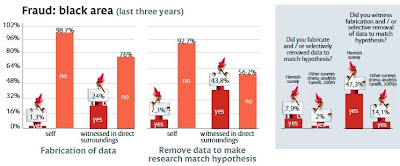How to improve the social sciences
Social scientists (and psychology in particular) have in recent years had somethings of a bad press, both in- and outside academia. To give some examples:
- There is a sense among some people that
social science provides little societal or economical value.
- Controversy over research findings within social science: for example the findings of
Bem et al. about the existence of precognition
, or the
estimation of the number of casualties in Iraq war
(2003-2007).
- Scientific fraud: in the Netherlands alone, we have had about five affairs of scientific fraud in the past few years. The biggest one being the
Stapel-affair:
a professor who dreamed up the data of about 50 high-profile scientific articles.
Now, I disagree with the fact that the social sciences do not contribute enough to society, but is hard to argue about this issue if people can argue that social scientists commit fraud, or are secretive about their methods and results. Also, I dislike the defensive attitude many social scientists take on fraud, opnness, and replicability. Instead of just being defensive, try do some something constructive with critique we receive as a field.
At this year’s GESIS summer school, I gave a talk about the topic of survey errors and how to improve social science as a whole. I think it is really time to change the way we as social scientists do our work. We have to be more open about what we do and how we do it. Not only so we can strenghthen the position of the social sciences in general, but more importantly to make progress as a field. Many theories in the social sciences are founded on empirical research findings, that can either not be replicated, are based on wrong statistical analyses, or are based on fraudulated data. Dreaming up data is the worst example of fraud, but I count as fraud also selectively deleting those cases that don’t support your theory, or presenting exploratory analyses as confirmatory. This last point especially is common throughout the social sciences (and in other disciplines as well).
Summaries of a survey on scientific fraud in medical faculties in the Flanders region of Belgium _(source: https://blogs.scientificamerican.com/talking-back/2013/05/02/spring-and-scientific-fraud-is-busting-out-all-over/)_
Here is my idea of how to start making things better:
1. Publish your data. Unless you work with medical or otherwise privacy-sensitive data, I see no reason why not all data should be published online at some point. Of course, data need to be cleaned after data collection, and researchers may keep data for themselves for a limited amount of time, if they fear others may steal their good research ideas. But once a paper is published, the data should become available. No excuses
2. Document your analyses. If you publish your data, why not publish your analyses scripts and logs of your analyses as well, so everyone can easily replicate your analyses? We need more replication in the social sciences, and should make it more attractive for researchers to do this. Yes, that means that data analysis errors may be exposed by other researchers. But in my view, this is the only way we can progress as social sciences.
And as I believe in practice what you preach, I am putting all my data and analysis-scripts at this webpage (see publications ). As I do not own all the data, I am still working out how to do this with some of my co-authors, but my goal is to really have all my data and scripts/syntaxes there, so everyone can replicate my analyses given they use the same software.
The slides for my presentation at GESIS are found here . There is also a video-recording of the lecture, that can be found here
